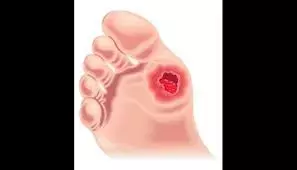- Home
- Medical news & Guidelines
- Anesthesiology
- Cardiology and CTVS
- Critical Care
- Dentistry
- Dermatology
- Diabetes and Endocrinology
- ENT
- Gastroenterology
- Medicine
- Nephrology
- Neurology
- Obstretics-Gynaecology
- Oncology
- Ophthalmology
- Orthopaedics
- Pediatrics-Neonatology
- Psychiatry
- Pulmonology
- Radiology
- Surgery
- Urology
- Laboratory Medicine
- Diet
- Nursing
- Paramedical
- Physiotherapy
- Health news
- Fact Check
- Bone Health Fact Check
- Brain Health Fact Check
- Cancer Related Fact Check
- Child Care Fact Check
- Dental and oral health fact check
- Diabetes and metabolic health fact check
- Diet and Nutrition Fact Check
- Eye and ENT Care Fact Check
- Fitness fact check
- Gut health fact check
- Heart health fact check
- Kidney health fact check
- Medical education fact check
- Men's health fact check
- Respiratory fact check
- Skin and hair care fact check
- Vaccine and Immunization fact check
- Women's health fact check
- AYUSH
- State News
- Andaman and Nicobar Islands
- Andhra Pradesh
- Arunachal Pradesh
- Assam
- Bihar
- Chandigarh
- Chattisgarh
- Dadra and Nagar Haveli
- Daman and Diu
- Delhi
- Goa
- Gujarat
- Haryana
- Himachal Pradesh
- Jammu & Kashmir
- Jharkhand
- Karnataka
- Kerala
- Ladakh
- Lakshadweep
- Madhya Pradesh
- Maharashtra
- Manipur
- Meghalaya
- Mizoram
- Nagaland
- Odisha
- Puducherry
- Punjab
- Rajasthan
- Sikkim
- Tamil Nadu
- Telangana
- Tripura
- Uttar Pradesh
- Uttrakhand
- West Bengal
- Medical Education
- Industry
Urokinase therapy improves diabetic foot ulcers healing and decreases CV events in diabetes patients

Urokinase therapy improves diabetic foot ulcer healing and decreases CV events in diabetes patients suggests a new study published in the BMJ Open Diabetes Research & Care.
Diabetic foot ulcer (DFU) is a disabling complication of diabetes mellitus. Here, we attempted to assess whether long-term intrafemoral artery infusion of low-dose urokinase therapy improved Diabetic foot ulcers and decreased cardiovascular events in patients with Diabetic foot ulcers. Diabetic foot ulcers were randomized to continuous intrafemoral thrombolysis or conventional therapy groups. The continuous intrafemoral thrombolysis group received continuous intrafemoral urokinase injection for 7 days, and conventional therapy just received wound debridement and dressing change. Then, a follow-up of average 6.5 years was performed.
Results: Compared with conventional therapy, at the first 1 month of intervention stage, the ulcers achieved a significant improvement in continuous intrafemoral thrombolysis group including a complete closure (72.4% vs 17.5%), an improved ulcer (27.6% vs 25.8%), unchanged or impaired ulcer (0% vs 56.7%). During the 6.5-year follow-up, for the primary outcome of ulcer closure rate, continuous intrafemoral thrombolysis therapy obtained a better complete healing rate. For the secondary outcome of cardiovascular disease events, continuous intrafemoral thrombolysis therapy had a lower incidence of cardiovascular events. Importantly, intrafemoral thrombolysis therapy decreased the incidence of cardiovascular death (HR 0.42 Additionally, continuous intrafemoral thrombolysis therapy improved local skin oxygenation, peripheral neuropathy, and glycolipid metabolic profiles compared to conventional therapy group (p<0.05). Continuous intrafemoral thrombolysis therapy has a better therapeutic efficacy to improve Diabetic foot ulcers and decrease cardiovascular events.
Reference:
Tong J, Zhang J, Xiang L, Li S, Xu J, Zhu G, Dong J, Cheng Y, Ren H, Liu M, Yue L, Xiang G. Continuous intrafemoral artery infusion of urokinase improves diabetic foot ulcers healing and decreases cardiovascular events in a long-term follow-up study. BMJ Open Diabetes Res Care. 2024 Jan 12;12(1):e003414. doi: 10.1136/bmjdrc-2023-003414. PMID: 38216296.
Dr. Shravani Dali has completed her BDS from Pravara institute of medical sciences, loni. Following which she extensively worked in the healthcare sector for 2+ years. She has been actively involved in writing blogs in field of health and wellness. Currently she is pursuing her Masters of public health-health administration from Tata institute of social sciences. She can be contacted at editorial@medicaldialogues.in.
Dr Kamal Kant Kohli-MBBS, DTCD- a chest specialist with more than 30 years of practice and a flair for writing clinical articles, Dr Kamal Kant Kohli joined Medical Dialogues as a Chief Editor of Medical News. Besides writing articles, as an editor, he proofreads and verifies all the medical content published on Medical Dialogues including those coming from journals, studies,medical conferences,guidelines etc. Email: drkohli@medicaldialogues.in. Contact no. 011-43720751


